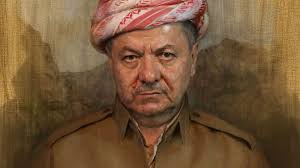The Opportunist, Massoud Barzani
< < Go Back
When ISIS threw the Middle East jigsaw puzzle into the air, the Kurdish leader reached for a piece.
What does it say that the most reliable U.S. ally in its campaign against ISIS is an imaginary country? Kurdistan—Land of the Kurds—exists only in two spheres. One is on maps sold in bazaars wherever the Kurdish language is spoken.
The other is on yellow-red-and-green flags Kurds sometimes wave in the countries where they actually reside (according to maps sold everywhere else in the world).
Yet in one of those countries, the Kurds have built themselves a state in all but name. Far to the north of Baghdad, where Iraq’s deserts rise into stony foothills and then into mountains, the Kurdistan Regional Government holds sway. The young statelet has its own army, legislature, border checkpoints, foreign policy and, in Massoud Barzani, a powerful President whose life encapsulates the history of a people whose time finally appears to have come.
The first time Barzani visited the White House, back in 2005, he was dressed, as usual, in a baggy jumpsuit gathered under a cummerbund just below the chest, epaulets and a red-and-white scarf whorled into a squarish turban. It’s the traditional garb of Kurdish males, including Barzani’s father Mustafa, the most famous Kurd since the 12th century general Saladin. A revolutionary who fought for 60 years to create a Kurdish state, Mustafa succeeded for only a year and change in 1946, just long enough for Massoud to be born within its confines. Then its land was reclaimed by Iran, and Mustafa’s soldiers returned to their struggle for independence.
When the old warrior died, in a Washington hospital in 1979, his legacy of stubborn resistance and noble failure defined the Kurds as the region’s hard-luck heroes, earnest and worthy but doomed to remain the world’s largest ethnic group without a nation of its own.
The legacy of Massoud Barzani, now 68, is still being written. But as the hordes from the Islamic State of Iraq and Greater Syria (ISIS) swarmed north from Fallujah in the first days of June, conquering Iraq’s second largest city in four days and then pivoting toward Kurdish lands, one thing was clear: Iraq’s Kurds—and the perhaps 22 million other Kurds around the region—were at a turning point. In many ways, Iraqi Kurdistan was stronger than it had ever been before, with a functioning military and an economy that saw GDP per capita soar from $800 to $5,600 over the past 10 years. All that was suddenly at risk. Kurds are Muslims, and overwhelmingly Sunni at that, but of a tolerant tradition that draws the wrath of the fundamentalists who make up ISIS. On a front stretching 600 miles (965 km), the peshmerga, as the Kurds’ fighters are known, at first were pushed back, outgunned by the well-armed extremists. Not until Aug. 6, when ISIS artillery was arrayed just 30 miles (48 km) from his capital of Erbil, did Barzani issue the order to “fight the terrorists to the last breath.” By then, the Pentagon had his back.
On the ground, the stakes are even higher. Barzani, the leader of a stateless people, now stands in a position to decide the future of Iraq and with it, perhaps, that of the Middle East.
Under new Iraqi Prime Minister Haider al-Abadi—and with the help of U.S. air strikes—Baghdad has managed to rally against ISIS. But it is still the Kurds who are doing much of the fighting against the jihadists, which is appropriate—their goals couldn’t be more different.
on June 29, Barzani announced that Iraqi Kurds would vote “within months” in a referendum on independence. “From now on, we won’t hide that that’s our goal,” he said.
The paradox is that a new Kurdish state could prove as destabilizing to the Middle East as an ISIS victory. Besides roiling Kurdish populations beyond Iraq, redrawing borders risks further undermining the shaky sovereignty of Syria, Libya and Yemen. For now, though, the Kurds seem willing to use their leverage to improve their position within a still existing Iraq, delaying once again the push for independence. On Dec. 2, Barzani approved a pact with the new Iraqi government that ties the Kurds more closely to Baghdad, papering over a rift that began when Barzani stopped sending oil south.
The deal was pushed strongly by the U.S., and it illustrates both the constraints facing Barzani’s government and his talent for navigating them.
More From TIME Magazine:




